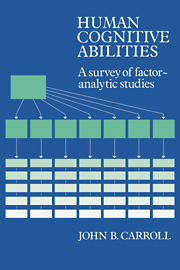Book contents
- Frontmatter
- Contents
- Preface
- PART I INTRODUCTION TO THE SURVEY
- PART II THE IDENTIFICATION AND DESCRIPTION OF COGNITIVE ABILITIES
- PART III ISSUES
- Chapter 16 A Theory of Cognitive Abilities: The Three-Stratum Theory
- Chapter 17 Issues About Abilities: Nature and Nurture, and Others
- Chapter 18 Implications and Recommendations
- References and List of Datasets
- Appendix A Codes for Countries, Samples, and Factors
- Appendix B Hierarchical Factor Matrix Files
- Name Index
- Subject Index
Chapter 18 - Implications and Recommendations
Published online by Cambridge University Press: 29 September 2009
- Frontmatter
- Contents
- Preface
- PART I INTRODUCTION TO THE SURVEY
- PART II THE IDENTIFICATION AND DESCRIPTION OF COGNITIVE ABILITIES
- PART III ISSUES
- Chapter 16 A Theory of Cognitive Abilities: The Three-Stratum Theory
- Chapter 17 Issues About Abilities: Nature and Nurture, and Others
- Chapter 18 Implications and Recommendations
- References and List of Datasets
- Appendix A Codes for Countries, Samples, and Factors
- Appendix B Hierarchical Factor Matrix Files
- Name Index
- Subject Index
Summary
The key to understanding the IQ controversy lies in the historical conflict between two strands in American thought: the desire for increasingly efficient and objective assessment, and the belief in human equipotentiality.
Mark Snyderman and Stanley Rothman (1986, p. 11)Human beings, we have come to appreciate, are immensely diverse, not only in their physical characteristics, but even more in their behaviors, personalities, and capabilities. It is with a sense of wonderment that the scientist or even the ordinary person on the street contemplates this enormous diversity and hopes to make sense of it by reducing it to some set of cardinal ideas or principles.
In this book, I have focused on just one domain of human diversity – the domain of what may be called cognitive abilities. This domain alone, it appears, is far-flung and finely divided. For more than a century, since the days of those who first broached the possibility of studying individual differences in cognitive abilities – Francis Galton, James McKeen Cattell, Alfred Binet, William Stern, Charles Spearman, and others – psychologists have attempted to find ways of understanding the diversity of these abilities, first by developing procedures for objectively measuring them and then by formulating ways of classifying them and investigating their structure. Two principal instruments for doing these things have been (1) the mental test and (2) the statistical technique known as factor analysis.
- Type
- Chapter
- Information
- Human Cognitive AbilitiesA Survey of Factor-Analytic Studies, pp. 688 - 714Publisher: Cambridge University PressPrint publication year: 1993



